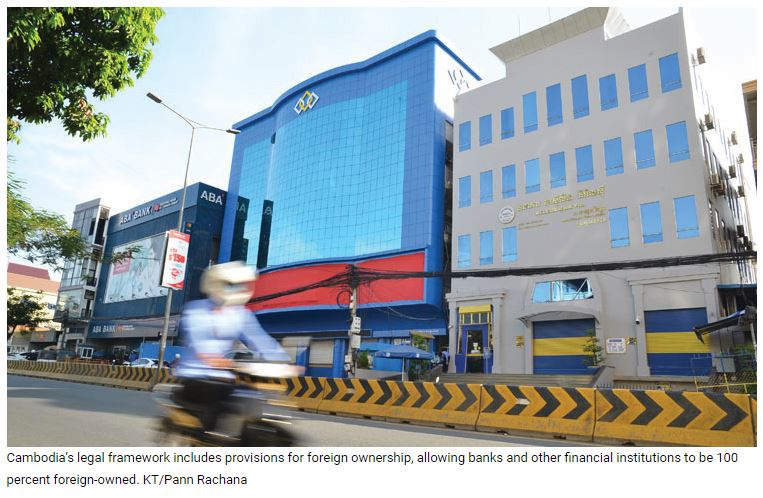Cambodia: Foreign bank expansion into Kingdom welcome and well regulated
With more foreign banks entering the market in the Kingdom, questions have been raised as to whether the market will become saturated. Experts say, though, that Cambodia has sufficient space within its growing economy and that the addition of foreign banks can only be positive as it brings with it, investment, expertise and financial technology.
Cambodia’s legal framework includes favourable provisions for foreign investors seeking to invest in the country’s banking sector. Chief among those are that there are no restrictions on foreign ownership, with overseas banks and other financial institutions being capable of 100 percent ownership.
Foreign investors and banks can structure their expansion in Cambodia by way of a subsidiary, branch, or representative office. Subsidiaries and branches are both permitted to engage in banking activities in Cambodia. In the case of a subsidiary, a foreign investor can incorporate a bank in Cambodia, (owning up to 100 percent of its shares), or acquire the shares of an existing bank.
Association of Banks in Cambodia (ABC) General Manager Heng Koy explained that the entry of more foreign banks into the market is a cause for excitement and positive sentiment.
“More banks mean more competition, [and that] always plays to the benefit of the consumer. While there are already a significant number of lending institutions [here], estimates by the World Bank state that Cambodia still has a financing gap of several billion dollars. Every new entrant and every additional dollar lent in Cambodia is therefore very welcome.” Heng said.
Heng also mentioned the benefits of bringing in foreign banks in terms of keeping up with technologies and expertise already in place elsewhere across the global financial sector. “While Cambodia has become very innovative in recent years, [a blending] of domestic [and] foreign technologies can only benefit the Cambodian consumer,” noted Heng. “That said, we also know that there are criticisms and [that] some people think that Cambodia´s financial sector is close to being saturated. While we respect and acknowledge such statements, we are confident that Cambodia´s growing economy does continue to offer room for more players.”
When asked whether foreign banks are becoming more relaxed with certain regulations because of stiff competition in the market, Heng explained that the guidelines in place are being strictly adhered to and are monitored by both the Cambodia Microfinance Association (CMA) and the Credit Bureau Cambodia (CBC).
“ABC’s Banking Code of Conduct sets standards and good banking practices that individual customers, business customers and guarantors can expect to encounter when dealing with financial institutions. Moreover, ABC, in collaboration with the CMA, is working on lending guidelines [designed] to improve the standardisation of good banking practices in Cambodia. Furthermore, the Credit Bureau of Cambodia (CBC) plays an important role in ensuring that banks and financial institutions avoid any overlap in lending, to prevent over-indebtedness,” said Heng.
According to Kaing Tongngy, head of CMA’s communications department, the lending guidelines for loans in Cambodia ensure that risk assessment is in place when it comes to people taking on loans and to guarantee that bank lending practices are both fair and sustainable.
“Financial services in Cambodia have dramatically improved, becoming more affordable to all kinds of people, partly as the result of increased investment and competition. All of these banks must follow our guidelines, [particularly as they pertain to lending practices].”
He added: “Our Lending Guideline (LG) sets a standard practice in the client protection initiatives that CMA introduced to members many years ago that has now been expanded to the banking industry. This expansion will ensure sustainable and ethical lending across the whole financial sector. LG aims to ensure that best practices [are followed] in loan [granting] by limiting high and medium-risk loans. CMA has a dashboard with CBC that monitors real-time loan provision, which ensures that none of our members breach the limits. Anyone who breaches the limit will be warned and that warning could result in their licence being revoked.”
Currently, Cambodia has 52 commercial banks, 14 specialised banks, six microfinance-deposited institutions, 75 microfinance companies, 15 leasing companies, 24 payment service institutions and 2,889 currency exchanges.
Source: https://www.khmertimeskh.com/50792642/foreign-bank-expansion-into-kingdom-welcome-and-well-regulated/


 Thailand
Thailand




